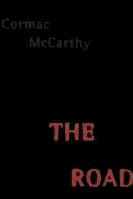> My friend Ann Barker, who lives in Chiapas, Mexico, doesn’t like Cormac McCarthy’s work. “baroque” she calls it, but she must use that term for anything she doesn’t like because McCarthy’s dark spareness is anything but baroque—there is hardly any ornamentation at all. Even metaphor is minimal and the sentences are generally straightforward and short, or fragmented. This spareness is not always welcome—in No Country for Old Men, for example, I longed for some variety—but in McCarthy’s latest book, The Road, it is simply beautiful.
My friend Ann Barker, who lives in Chiapas, Mexico, doesn’t like Cormac McCarthy’s work. “baroque” she calls it, but she must use that term for anything she doesn’t like because McCarthy’s dark spareness is anything but baroque—there is hardly any ornamentation at all. Even metaphor is minimal and the sentences are generally straightforward and short, or fragmented. This spareness is not always welcome—in No Country for Old Men, for example, I longed for some variety—but in McCarthy’s latest book, The Road, it is simply beautiful.
In a world in ruin, what other language can you use? When father and son are on traveling, day by day, step by step, it is perfect to record their journey with a series of steps. Anything else would be, um, baroque.
“They followed a stone wall past the remains of an orchard. The trees in their ordered rows gnarled and black and the fallen limbs thick on the ground. He stopped and looked across the fields. Win in the east. The soft ash moving in the furrows. Stopping. Moving again. He’d seen it all before. Shapes of dried blood in the stubble grass and gray coils of viscera where the slain had been field-dressed and hauled away. The wall beyond held a frieze of human heads, all faced alike, dried and caved with their taut grins and shrunken eyes.”
This isn’t a complicated story. The job of the father is to protect his son and he is prepared to do anything it takes. It isn’t entirely clear what has happened, or where they are going (other than “south” in order to be free of winter), but the layering of information, the rendering of the practicalities of life on the road in this world is wonderfully compelling and shocking. Highly recommended.
Here is one review, from The Washington Post.

>Hi.
I taught English with Ann Barker at the Universidad Autonoma de Chiapas in Tuxtla-Gutierrez from 1984 to 1987. Do you know how I can get in touch with her? If she has email, please ask her to email me at marycarol.wagner@gmail.com.
Thanks.
Mary-Carol Wagner